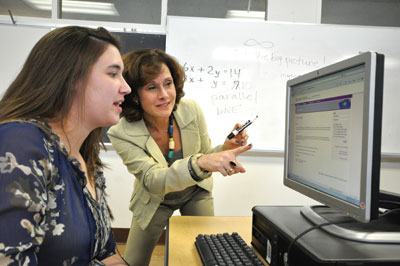Cerritos College
Ronda Neugebauer, an instructor at Chadron State College in rural northwestern Nebraska, sees great promise in the open educational resources (OER) movement.
"OER is just what higher education needs in light of the threats to funding and resources," says Neugebauer, who teaches transitional studies to students who need help with reading and writing.
Chadron State College instructor Ronda Neugebauer explains her institution's role in the Kaleidoscope project. |
Yet many faculty members have been slow to adopt OER, because of challenges finding high-quality resources and the effort required to fully redesign courses using new materials. To overcome these problems and explore the potential for cooperative course design based on OER, Chadron is one of eight colleges participating in Project Kaleidoscope, which began in May 2011 with funding from a Next Generation Learning Challenges grant. In three months, faculty teams from Cerritos College (CA), Chadron State College, Tompkins Cortland Community College (NY), Mercy College (NY), Santa Ana College (CA), Santiago Canyon College (CA), Palo Verde College (CA), and College of the Redwoods (CA) created course designs for 10 common general education courses using only OER material. Courses share common learning assessments, allowing teams to evaluate and improve course designs.
The collaboration has its roots at Cerritos College, a veteran of the open source and OER movements. The college is a longtime user of the Sakai open source LMS and has its own internal publishing house. Building on that experience, M.L. Bettino, former dean of academic affairs at the college, developed an informal network of colleagues at small schools to keep in touch on OER developments. "We always knew that when the right grant application came along, we would go for it--open source, open platform, open resources," says Bettino, who serves as the Kaleidoscope project's primary investigator.

After a successful pilot this spring, Mercy College will use the Kaleidoscope course design for all 23 sections of Intermediate Algebra. |
The cross-institutional group of instructors also garnered support from open education leaders at Brigham Young University (UT), MIT, Carnegie Mellon University (PA), and Creative Commons. "When the curriculum development teams ran into issues, this network provided advice, so the project maintains a connection to the broader OER community," says Kim Thanos, whose Portland, OR-based consulting firm, Thanos Partners, serves as project manager.
As a key indicator of the project's success, Bettino points out that faculty have found the OER materials to be of comparable quality to traditional textbooks. In fall 2011, the first term the Kaleidoscope courses were delivered, there was a 3.5 percent improvement in student success (completion with a C or better). One intermediate algebra course, taught by the same instructors, saw 100 percent improvement in success rates.
The project may prove particularly valuable to colleges working with low-income students who struggle to afford textbooks, Bettino notes. "It is so frustrating to community college teachers when their students show up the first week without textbooks because they are waiting for a paycheck or for financial aid," he says. "Now they can get their hands on these materials early and really be prepared on day one." Students participating in the Kaleidoscope project have seen a 97 percent reduction in textbook costs.
This year, several of the Kaleidoscope schools started using the rSmart Academic LMS, built on the Sakai open academic environment, which allows faculty to pull Kaleidoscope modules into their courses and add localizations. It also allows users to access the reservoir of openly licensed, shared content used in the Kaleidoscope courses.
"This is the only LMS designed for the era of open sharing of content and a collaborative approach to curriculum design, so it could not be a more perfect match," says Thanos. "It allows for social connections and you can bring your academic content into your profile."
Chadron State's Neugebauer agrees, noting that rSmart Academic "gives you more control over your course with widgets and tools that make it easy to borrow and remix content."
In addition, several Kaleidoscope courses have adopted Flat World Knowledge textbooks, which allow students to view the books online at no cost or order an inexpensive print copy.
Initially, Thanos thought Kaleidoscope seemed like a small step in terms of technology, but now she sees it as part of something potentially much bigger. "We are creating an open content platform that we can build on," she says. "We are talking to other institutions about joining."
About the Author
David Raths is a Philadelphia-based freelance writer focused on information technology. He writes regularly for several IT publications, including Healthcare Innovation and Government Technology.